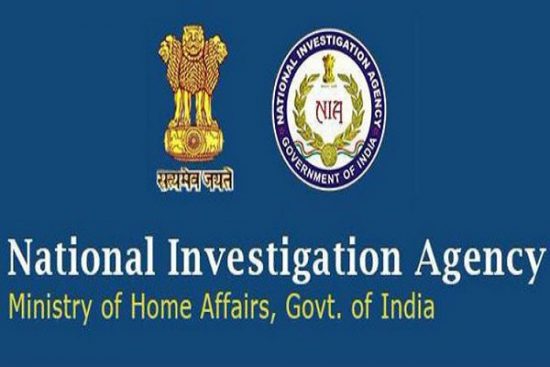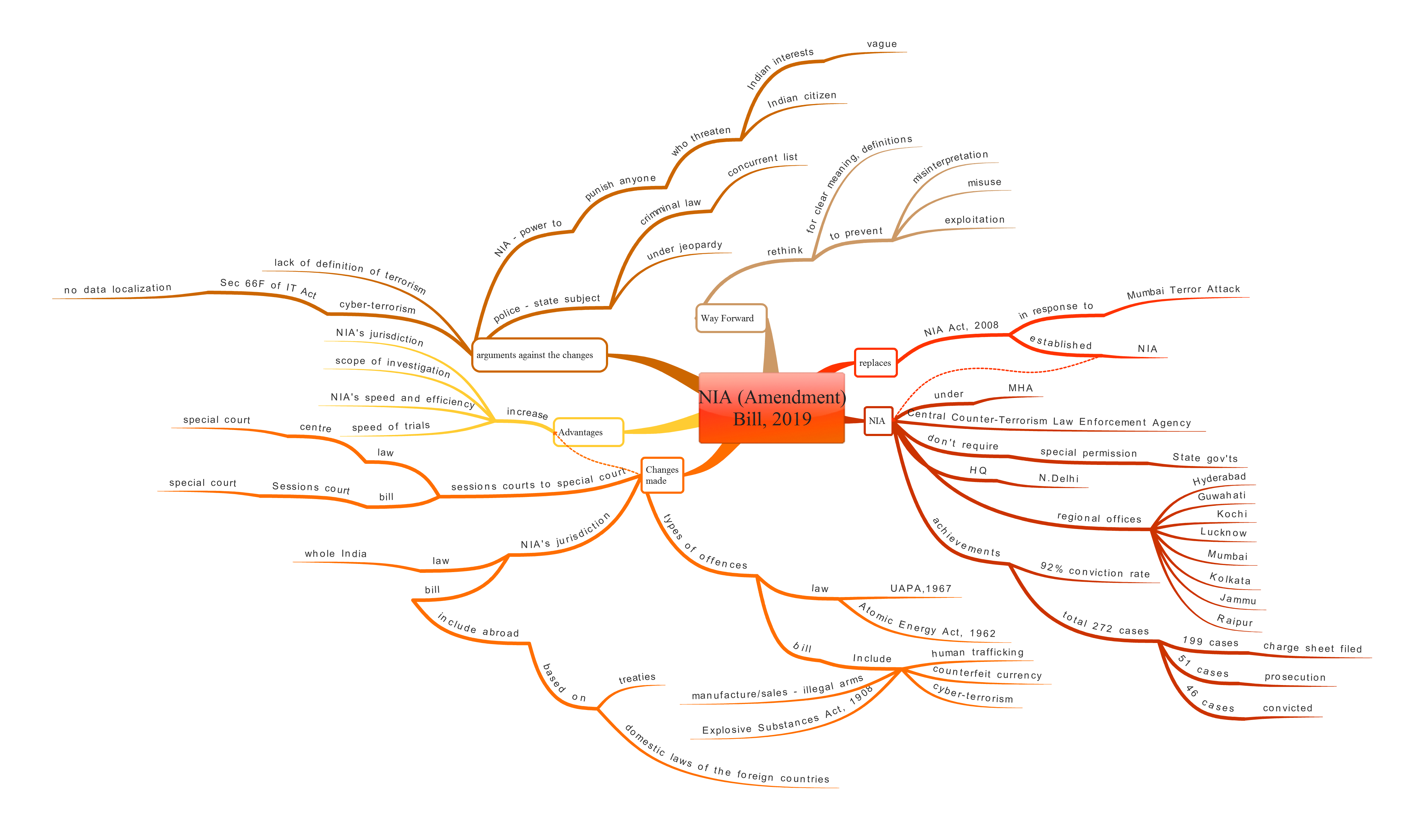National Investigation Agency (NIA) (Amendment) Bill, 2019 – Why is it in Contention?

The NIA (amendment) bill, 2019 has been passed in both the houses of the parliament and is waiting for the president’s assent to become a law. This bill makes several changes in the already existing National Investigative Agency (NIA) Act, 2008. This bill is under the public scrutiny because of the allegations of it encroaching into the jurisdiction of the states’ police departments and jeopardizing India’s federal structure.
This topic of “National Investigation Agency (NIA) (Amendment) Bill, 2019 – Why is it in Contention?” is important from the perspective of the UPSC IAS Examination, which falls under General Studies Portion.
What is the National Investigative Agency (NIA) Act, 2008?
- The National Investigative Agency was established under the National Investigative Agency (NIA) Act, 2008.
- This was in response to the Mumbai Terror Attack that happened in 2008.
- This Agency comes under the Ministry of Home Affairs.
- It is the Central Counter-Terrorism Law Enforcement Agency that helps counter, investigate and prevent any future terrorist attacks that may arise within the nation.
- This agency does not require any prior special permission from the states while undertaking terror-related investigations within the nation.
- Its headquarters is located in New Delhi.
- There are also 8 regional offices across the country. They are in:
- Hyderabad
- Guwahati
- Lucknow
- Mumbai
- Kochi
- Kolkata
- Jammu
- Raipur
What is the mission of the NIA?
- To win the public confidence through selfless and fearless endeavours.
- Study and analyse laws on countering terrorism in other countries and analyse the limitations of existing Indian laws and recommend changes if necessary.
- In-depth investigation on the scheduled offences through the latest scientific, result-oriented procedures that uphold the constitutional laws, human rights and dignity of the individual.
- Ensuring speedy and effective trial.
- Maintaining professional and amicable relationship with the States, the UTs and other law enforcement agencies in compliance with the legal provisions of the NIA act.
- Developing a professional force through regular training and exposure to ensure legal and professional practices while undertaking the investigations.
- Induct all the new and modern methods and technologies in all the activities of the agency.
- Assist all the States and other investigative agencies in the investigation of the terrorist cases.
- Build a database on all terrorist-related information and share these data with other agencies that are involved in the investigation of the terrorist cases.
What are the achievements of the NIA?
- The NIA’s conviction rate is currently 92%.
- Out of the 272 cases registered by the NIA, charge sheet has been filed in 199 cases, the prosecution in over 51 cases and convictions in 46 cases.
- NIA has designated and banned numerous terror organisations like Jammu and Kashmir Liberation Front, Jaish-e-Mohammad, Harkat-ul-Mujahideen, etc.
What are the changes made in the NIA amendment bill, 2019?
There have been three major changes that are made in the NIA amendment bill. They are as follows:
- Types of offences that the NIA is allowed to investigate and prosecute:
- In the existing Act, the NIA is allowed to investigate cases that come under the Atomic Energy Act, 1962 and Unlawful Activities Prevention Act, 1967.
- In the amended bill the NIA can also investigate offences related to human trafficking, counterfeit currency, cyber-terrorism, offences under Explosive Substances Act, 1908 and manufacture or sales of the prohibited arms.
- NIA’s jurisdiction:
- In the existing Act, the NIA has the same power as that of the police. However, their jurisdiction is spread across the country.
- In the proposed bill, the NIA’s jurisdiction is extended outside the international borders. However, those investigations done abroad are under the influence of the international treaties and domestic laws of the foreign countries.
- Designation of sessions courts as special courts:
- In the existing Act, the Centre constitutes special courts for trials of the offences that come under the purview of the NIA which is called scheduled offences.
- As per the proposed bill, the Central and the State Governments can designate Sessions Courts as Special Courts to conduct trials that come under this Act.
How do the proposed changes help the NIA?
- If this bill becomes a law, the NIA will have the power to investigate cases related to terror crimes that may affect Indians and Indian Interests abroad.
- This bill increases the scope of the investigations undertaken by the NIA. This is because new offences are also included like human trafficking, counterfeiting, etc.
- Terrorism is a complex interlinked and organised crime that requires higher coverage of law and investigative methods. This bill seeks to do the same by increasing the jurisdiction and including other supportive illegal activities related to terrorism.
What are the arguments against these changes?
- Law and Order and Police are a state subject. Under schedule VII of the Indian Constitution, the maintenance of the police force and the law and order of the state come under the state list.
- However, criminal law come under the concurrent list.
- The proposed bill allows the NIA to take over the investigations from the local police if there are offences that involve human trafficking, offences related to Explosive Act and offences under the Arms Act.
- However, not all such crimes are a threat to national security. This may let NIA breach into the jurisdiction of the local authorities and police.
- Lack of definition for terrorism: Despite years of campaigning on the War on Terror, the world is yet to decide the definition of terrorism. Terrorism is a complex and ambiguous term that encompasses many aspects that come under the purview of the law. This includes freedom of speech, advocating ideology, religion, etc. Therefore it remains vague and undefined.
- Cyber-terrorism: Under Section 66F of the Information Technology Act, the NIA will be able to investigate crimes related to the cyber-terrorism. However, India is yet to pass laws on the data localization.
- Through this amendment, the NIA is given the power to investigate any individual who commits a crime that threatens any Indian Citizens or affects the interests of India.
- However, the “interests of India” here is vague and does not have any solid meaning.
- Even the laws under which the NIA has the authority to investigate do not mention anything about the “interests of India”.
- The inclusion of new and unclear terms into these amendments allows for increased power to the NIA to interfere into the jurisdictions of the local authorities and jeopardize the rights of the individuals. This endangers the existing federal structure of the country.
Way Forward
- National Investigative Agency (NIA) Amendment bill along with Unlawful Activities (Prevention) Amendment Act, 2019 can increase the jurisdiction and power of the National Investigative Agency and the Central Government while dealing with the issues related to the terrorism and other related crimes.
- The increase of the efficiency and the power of the NIA are essential to curb the menace of the terrorism that threatens the sovereignty, integrity, security and the national interest of India.
- However, it is feared that these laws may create a police state – the one that is dominated by an Agency that comes under the central government.
- There must be clear and unambiguous definitions and terms within these laws for better and efficient law enforcement to counter terrorism.
- It is essential to rethink the content of these laws to prevent any misinterpretation, misuse, and exploitation by the authorities.
Article by: K.G.Karishma


